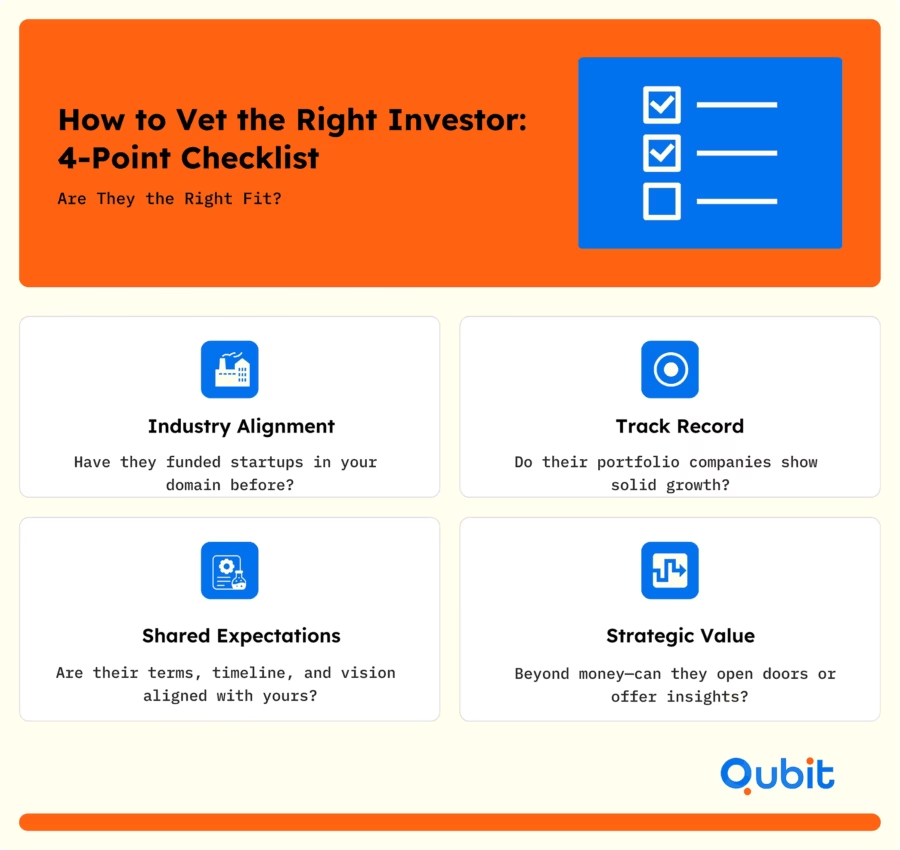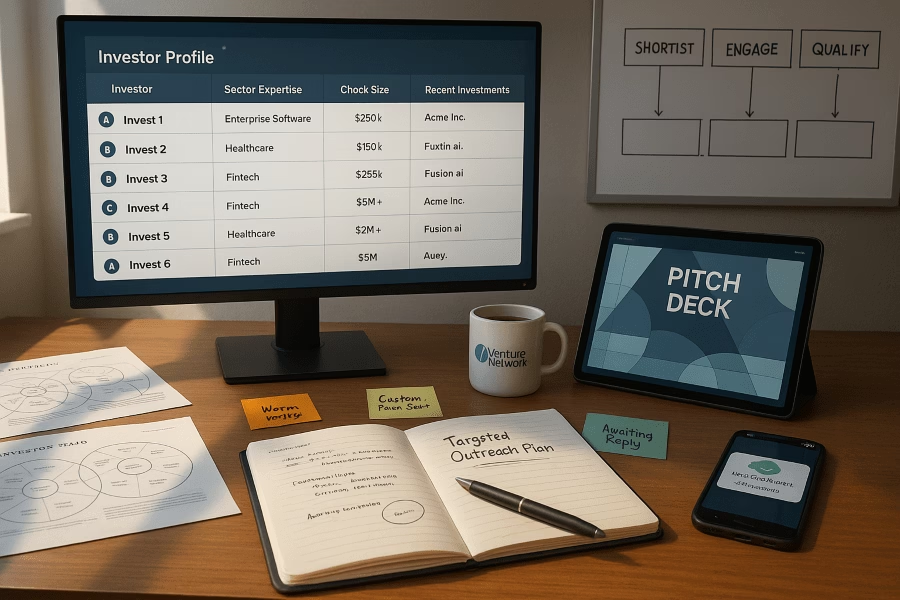Whether you're seeking private investors or venture capitalists, understanding how to connect with investors who align with your vision is crucial. This guide will help you explore the diverse types of backers available, prepare for funding discussions, and build lasting relationships.
For startups looking to refine their approach, learning how to find investors for startups is essential. This pillar connects seamlessly with the super pillar, offering detailed guidance on identifying and connecting with investors.
Let’s dive into actionable strategies that will empower your startup to attract the right investors and secure the funding it needs to thrive.
Types of Investors: From Informal to Institutional
1. Friends and Family Investors
Early-stage startups often turn to friends and family for initial funding. While these rounds may seem informal, treating them with legal rigor is crucial. Resources like SEC Info provide guidance on compliance, ensuring these investments align with regulatory standards.
2. Angel Investors
Angel investors typically fund startups during their seed stage, offering smaller amounts of capital in exchange for equity. These investors often bring valuable mentorship and industry connections, making them ideal for startups seeking both financial and strategic support.
3. Venture Capital Investors
Venture capital investors focus on high-growth startups, providing substantial funding to scale operations. Firms like a16z are renowned for backing disruptive technologies and offering access to extensive industry networks. For example, Uber’s $1.2B venture capital funding enabled its rapid expansion to over 60 countries.
4. Institutional Investors
Institutional investors, such as private equity firms and pension funds, typically engage in later-stage funding rounds. These entities bring significant capital and often demand a proven track record of growth and profitability.
Funding Strategies: Choosing the Right Path
Seed Funding
Seed funding is the initial capital raised to develop a product or service. Startups often secure seed funding from angel investors or friends and family. For instance, Airbnb’s $7.2M Series A funding helped scale its operations globally, eventually leading to an $86.5B IPO valuation in 2020.
Venture Capital Rounds
Venture capital rounds are structured funding stages, including Series A, B, and beyond. These rounds are designed to support startups as they scale operations, enter new markets, or develop advanced technologies.
Growth Capital
Growth capital is aimed at scaling established businesses. This funding often comes from institutional investors and is used for large-scale expansions, acquisitions, or product diversification.
ESG-Focused Funding
Emerging trends like ESG (Environmental, Social, and Governance) mandates are driving investments in climate tech. In Q3 2023 alone, $7.6B was invested in ESG-focused vehicles, highlighting the growing importance of sustainable business practices.
Legal and Strategic Considerations
Securing funding involves more than just pitching to investors. Legal compliance, strategic planning, and growth forecasting are critical components of the process. Using resources like SEC Info ensures startups adhere to regulatory requirements, particularly during informal rounds.
By understanding the nuances of investor types and funding strategies, startups can make informed decisions that align with their growth objectives.
Get Your Business Ready for Investors
A well-crafted business plan is the cornerstone of this process, showcasing your company’s vision, market strategy, and financial projections. Investors want to see a roadmap that not only highlights growth opportunities but also addresses potential risks with actionable solutions.
Transparency in financials is equally critical. Ensure your financial records are accurate, up-to-date, and easily accessible. This builds trust and allows private investors to evaluate your company’s fiscal health confidently. Conducting due diligence on your own operations before presenting to investors can further enhance credibility. This includes verifying compliance with legal regulations, assessing intellectual property rights, and ensuring all contracts are in order.
A compelling pitch deck can also make a significant impact. Tools like the Thinklions Pitch Deck Guide assist startups in creating persuasive presentations that demonstrate business viability. A well-structured pitch deck not only communicates your company’s strengths but also addresses investor concerns effectively.
Finally, don’t underestimate the value of attending investor networking events. These gatherings provide a platform to connect with investors and refine your readiness. An analytical discussion explores the dynamics of investor networking events, detailing how these gatherings can expand your circle of potential backers.
How to Find and Choose the Right Investors
Identifying the right investors begins with understanding your startup’s unique needs and goals. Conducting systematic research is essential to pinpoint individuals or firms whose expertise aligns with your industry, growth stage, and vision. Use the primary keyword, find investors, to guide your search and focus on those who have a proven track record in your sector.

1. Research Industry-Specific Investors
Start by narrowing your search to investors who specialize in your niche. Whether you’re targeting venture capital investors or seed investors, look for those who have successfully funded similar startups. Their familiarity with your industry ensures they can offer more than just capital—they can provide valuable insights and connections.
2. Evaluate Track Records
An investor’s history speaks volumes about their reliability and approach. Review their portfolio to assess their success with startups at your stage. For example, if you’re in the early stages, prioritize seed investors who have a history of nurturing startups from inception to growth.
3. Align Expectations
Matching your startup’s profile with investor expectations is critical. Investors often have specific criteria, such as revenue benchmarks or market potential. Ensure your business model and growth trajectory align with their investment philosophy to avoid mismatched goals.
4. Build Relationships Strategically
Establishing connections with investors is not just about pitching your idea; it’s about creating mutual trust. Experienced mentors can play a pivotal role here. A reflective review emphasizes mentorship benefits in networking by showcasing how experienced advisors contribute to robust investor relationships.
By carefully filtering potential investors and aligning your startup’s profile with their expectations, you can create a balanced investment portfolio that supports long-term growth.
How to Make the Most of Co-Investment Deals
Collaborating with seasoned venture capitalists (VCs) and professional angel investors can unlock significant advantages for startup investors. Co-investment deals not only provide access to larger pools of capital but also connect participants with private investors who bring deep industry expertise to the table.
1. Shared Risk and Extended ROI Horizons
One of the primary benefits of co-investment is the ability to share risks across multiple stakeholders. This approach is particularly valuable in early-stage rounds, where startups often require extended periods to deliver returns. For instance, even the most successful startups typically have a minimum ROI period of 10 years, making shared risk an essential strategy for long-term growth.
2. Collaborative Investment Strategies
Co-investment deals thrive on synergy. By pooling resources and insights, investors can collectively identify promising opportunities and mitigate potential pitfalls. Platforms like accelerator programs further enhance these opportunities by showcasing group-based investor interest. Learn more about the benefits of accelerator programs to explore synergistic co-investment avenues.
3. Analytical Tools for Stake Comparison
Understanding participation stakes is crucial for making informed decisions in co-investment deals. Tools like the Cap Table Viewer simplify this process by enabling investors to compare co-investor stakes and evaluate their positions within the investment structure. This transparency ensures that all parties are aligned and helps optimize decision-making.
Co-investment deals offer a unique blend of shared expertise, reduced risk, and strategic collaboration. By utilizing tools and platforms designed for systematic investment strategies, startup investors can maximize their potential for success while building valuable connections with other investors.
Find Investment Advice on Specialized Platforms
Digital investment platforms have transformed how investors and entrepreneurs connect, offering tailored resources that simplify the discovery process. These platforms provide structured educational tools, including detailed FAQs and curated guides, to help users understand the nuances of finding investors. For those seeking venture capital investors, these resources can demystify complex processes, making them more accessible and actionable.
One standout feature of these platforms is their ability to foster networking opportunities. By connecting users with angellist investors and other professionals, they create a collaborative environment where ideas and funding opportunities flourish. Additionally, many platforms integrate forums and discussion boards, enabling users to exchange insights and build relationships that could lead to future investments.
For startup founders, personal branding for startup founders plays a pivotal role in amplifying exposure on these platforms. A strategic assessment discusses the impact of personal branding for startup founders, illustrating how thought leadership builds credibility with investors. This approach not only enhances visibility but also establishes trust, which is crucial in attracting the right investors.
Whether you're exploring venture capital or seeking angel investors, specialized platforms offer a streamlined way to access the resources and connections needed to succeed. By leveraging these tools, users can confidently navigate the investment landscape and unlock new opportunities for growth.
Angel investing opens doors to exciting opportunities for individuals looking to support innovative startups. Unlike traditional funding rounds, angel investors provide early-stage capital, often during the seed phase, to help businesses take their first steps toward growth. This type of investment typically involves higher risk but offers the potential for significant rewards.
Break Down the Essentials of Investment Contracts
Understanding the nuances of investment contracts is crucial for startup investors aiming to secure funding while aligning with their long-term goals. These agreements come in various forms, including SAFEs (Simple Agreements for Future Equity), convertible notes, and revenue share agreements. Each type offers unique advantages and risks, making it essential to evaluate them carefully.
SAFEs, for instance, provide a straightforward way to exchange capital for future equity without immediate valuation concerns. Convertible notes, on the other hand, act as debt that converts into equity under predefined conditions, offering flexibility for both parties. Revenue share agreements allow private investors to earn a percentage of a startup’s revenue, aligning returns with performance.
Conclusion
Securing the right investors requires a thoughtful approach that balances preparation, strategy, and execution. From understanding investor types and assessing readiness to refining selection processes and mastering co-investment tactics, each step plays a vital role in shaping successful partnerships. Equally important are the contractual fundamentals that safeguard your startup’s interests while fostering collaboration.
A compelling pitch deck, built around a clear narrative, can be the cornerstone of your investor outreach. Coupled with strategic connections, it ensures your vision resonates with the right audience. At Qubit Capital, we specialize in helping startups identify and connect with investors tailored to their growth stage.
If you're ready to connect with the right investors, we at Qubit Capital can help. Our Investor Discovery and Mapping service is designed to match you with investors that fit your growth stage. Let us help you take the next step in your journey.
Key Takeaways
• Clearly define your investor profile to attract the right backers.
• Understand options like equity and debt financing.
• Ensure investor readiness with a solid business plan and transparent reporting.
• Leverage coin investment strategies and specialized platforms for greater exposure.
• Make informed choices on contract structures to support sustainable growth.
Frequently asked Questions
What are startup investors?
Startup investors are individuals or entities—angels, venture capitalists, family offices, and crowdfunding backers—that provide capital in exchange for equity or debt. They differ by investment size, involvement level, risk appetite, and value-add services like mentorship or network access.






